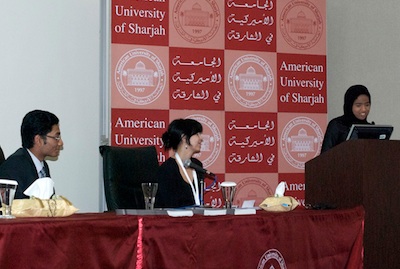WCMC-Q Students Present at Middle East Writing Conference
April, 2011

(L to R) Prashanth Venkatesh, Autumn Watts and Afaf Osman present
perspectives on WCMC-Q's peer consultation program to attendants of
the MENAWKA conference.
Four WCMC-Q students recently gave a talk at the Middle East-North Africa Writing Centers Alliance (MENAWCA) conference in Sharjah, UAE. Abdelaziz Farhat, Navid Iqbal, Afaf Osman and Prashanth Venkatesh, all first-year medical students, gave a presentation entitled “Developing a Peer Tutoring Program Within a Medical School: The Tutor’s Perspective.” The students joined dozens of speakers and hundreds of attendees to explore the importance of and evaluate techniques related to peer-based writing programs.
“In this region, the concept of a peer consultation program and writing center is so new,” said Autumn Watts, coordinator of the WCMC-Q writing center and the executive secretary of MENAWCA. “Our students demonstrated that a writing center is just as necessary and critical in a medical school as it is in other universities.”
The students’ presentation highlighted the key writing skills necessary to approach and master essays and assignments at every stage of their medical school careers. They also shared their personal experiences as peer consultants—what they thought it would be like and what it actually turned out to be.
“I expected a teaching job,” said Farhat, in his part of the presentation. “I thought I would be doing something like what an English TA would be doing, but we learned that a consultant is different from a tutor. We can show them what they did wrong and what they did right. We can help them talk through writer’s block. But we cannot take the paper from them.”
Attendance by liberal arts colleges was high compared to those dedicated to the sciences, but Watts said the writing center is imperative to the success of medical students completing essays and applications throughout their careers. She also said experience gained as a peer consultant enhances the development of any student, and sometimes medical students especially.
“Students learn about social navigation: empathy while exploring the challenges of differentiating between personal and professional lives—some of these people are the tutor's friends,” Watts said. “In particular, doctors needs to know how to listen—this is big: they are not there to tell, they are there to guide, to listen and to be a mirror … to reflect back.”
In addition to giving their presentation, the students attended sessions, including the new Middle East North Africa Writing Center Tutors forum, which saw them building contacts and sharing information with tutors and consultants throughout the region.
“We met about 30 other consultants and discussed how to set up appointments, the nuances of different languages and dealing with training,” said Osman. “And we made sure we’d stay connected through a MENA forum on Facebook.”
Watts said that the 15 peer consultants at the WCMC-Q writing center meet every two weeks to discuss their experiences with students and brush up on skills.
“Peer consultation is all about writing, languages, thinking, revising, improving,” she said. “People think that learning and writing are a linear process: a to b and turn it in—but writing is a non-linear process, actually, an open-ended process.”
By Emily Alp
